- Home
- Will Hobbs
City of Gold Page 7
City of Gold Read online
Page 7
The bowlegged stableman was there, Fred Tatters, who’d pretended only yesterday to know nothing. “Good job,” Tatters said, patting me on the back. “Let’s head for the stable. He needs water and a rub-down, and some good feed.”
“I was promised a talk with the superintendent,” I said.
“First things first,” replied Tatters. He was right about that. I followed him to the stable. On the way I stopped and showed him the fresh burns added to our omega brand. They were plain as day. The mud was gone, washed away by sweat. Tatters shrugged and said straight-faced, “I’m not seeing what you’re seeing.”
“Any fool can see it!” I cried.
He smirked and said, “So, what does that make you?”
Trying to keep a grip on myself, I went in search of the mine office while Tatters led Hercules to the barn. At the office, the assistant said, “Who said you could talk with the super?”
“The packer. We made a deal.”
“What packer?”
I’d barely begun to explain when the pencil pusher cut me off. “Whoever it was, he didn’t have the authority. The super has bigger fish to fry. Anything having to do with horses and mules, you’ll have to talk to Fred Tatters over at the barn.”
I told him I’d been double-crossed, and left mad as a hornet. Outside, I looked around for the packer. Already left for town? Where was the crowd that hailed us, anybody who might help? They had evaporated, every single one.
I hurried back to the stable, intent on collecting Hercules and putting the Tomboy behind us. Hercules was deep in the barn with his muzzle in a grain bag. The hulking man grooming him looked like he knew his way around mules. I approved of him using a brush rather than a metal currycomb, but all the same I resented him fiercely. “Not too much grain,” I said. He glared at me, didn’t say a word.
Tatters was in his office. “I’m taking Hercules,” I announced.
“I wouldn’t advise it,” he said, a grin showing under his droopy mustache.
“Why is that?”
“Big Herm’s got his orders.”
“Who’s he?”
“My stablehand. He’s good with animals but not with people. Don’t try to reason with him—I guarantee you he’ll lose his temper. Break your arm or worse.”
“Okay, I’ll reason with you.”
“Be my guest.”
“You lied to me, Mr. Tatters. Yesterday you said you never laid eyes on the animal.”
“At the time that was a true fact.”
“Well, you’d just heard about him over the phone. You lied.”
“I did no such thing. Seeing is one thing, hearing’s another. Now, the Tomboy’s got a bill of sale—”
“From a rustler! It’s phony!” I was on the verge of calling him a crook for playing along.
“Look, kid, I’ve got a job to do. If you got a beef, take it to the marshal.”
“I will, and soon. Just tell me you’re not going to hide Hercules underground.”
“He’s too big for tunnel work. We bought him for packing jobs like the one today. Until they make the trail into a wagon road, we’re going to need him. Let’s not make a habit of these little talks, eh?”
“There’s no chance you could’ve got that piece of machinery up here without me and you know it.”
“Nobody’s going to remember what you did today, kid, they’re going to remember the mule. Welcome to mining country. Now beat it.”
14
Fire on the Mountain
FROM BREAKFAST AT the boarding house Tuesday morning, I went directly to the marshal’s office and was invited by a deputy to warm a chair. I was remembering the marshal’s poor behavior on the street the day before. It was clear to the crowd and high heaven that the mule was mine, yet he wouldn’t lift a finger. Somehow I had to convince him to take Hercules from the Tomboy, find out where Peaches was, and go after the rustler. More than likely I’d seen the culprit going into the bar Saturday afternoon. He might still be in town.
I’d only been waiting a couple minutes. The clock on the wall said 7:45 when a man in grimy overalls burst through the front door, wild-eyed and gasping. “Fire at the Smuggler-Union! It’s bad, real bad!”
His shouting rousted the lawman from the back. Marshal Clark was wearing his Stetson and gun belt. Jim Clark listened intently as the miner told his story. The fire might’ve started at the stable. It spread quickly to the tramway platform and the covered works at the mouth of the Bullion Tunnel. Everything was going up fast with huge volumes of oily black smoke. There was talk of blowing up a building to keep the fire from reaching the boarding house. During this whole account I was thinking of Hercules. Thank God he wasn’t at the Smuggler-Union. He was out of harm’s way at the Tomboy.
“Any loss of life?” was Clark’s first question.
“Not that I know of.”
The marshal’s gun belt had my attention. His hand cannon was an ivory-handled Colt .45. “Injuries?” he inquired.
“Don’t know. It was all happening fast, and there was so much smoke. The phone line to town went down. Hardly any water for fighting the fire.”
“So, plenty of property damage. We know that much.”
“The Tomboy is sending a crew over to help.”
Just then the marshal noticed me sitting there and cast a withering glance at his deputy. Needless to say I got shooed out in a hurry. I’m pretty sure he recognized me from the day before, on the street with Hercules, but he could’ve cared less. With this emergency on his hands, I had a bad feeling I wasn’t going to be able to plead my case anytime soon.
On the street everything felt ominously calm, but within minutes people were out on the boardwalk pointing high to the north. The cloud of smoke was awful black. I wondered if Merlin Custard knew, and what he might have to say. On my way to the boarding house, there were a lot more people craning their necks. They’d heard that the fire was up at the Smuggler-Union.
I found Merlin in the backyard with some of his Cousin Jacks, as the Cornish miners were called. Looking skyward toward the inky, billowing smoke, they were engaged in highly agitated conversation with overtones of dread and undertones of anger. As fast as they were speaking, their brand of English was a whole other language. I waited on a bench nearby for Merlin to come and explain.
When the men went indoors for coffee, Merlin sat down with me. “Heard about the fire, have you?”
“When I was waiting to see the marshal.”
He wiped his forehead with a handkerchief. “This could be bad, Owen, extremely bad. If that smoke got in there—”
“In where?”
“Into the tunnel, down the shaft and into the drifts.”
“How could the smoke get into the tunnel?”
“From natural suction. Mines breathe, same as caves. The Bullion Tunnel can be downright windy. That’s what the men were talking about just now. Given the smoke and confusion, I’m afraid we haven’t heard the whole story.”
“Were men working inside?”
“The night shift—around a hundred.”
“I met some of the night shift Sunday on their way back to work.”
“Now you can pray for them. Back in ’78, twenty-seven men lost their lives in a bad snowslide above the Bullion Tunnel. This could be worse.”
From top to bottom, as Merlin explained, the Smuggler-Union was nearly two thousand feet deep. The Bullion Tunnel accessed the main shaft about halfway down. These days it was the main entrance for the miners, and it was where the ore came out in carts to be sent down the tramway. Where the tunnel met the main shaft, the men rode the hoist cage down to the lower levels—a thousand feet down to the ninth level at the bottom. “That’s where the men were working when this happened,” Merlin said.
“You think it’s likely the smoke got in and went to the bottom?”
“I fear the worst. A lot of what’s probably burning—the boiler and all its fuel, the engine, the converter—sit as close as fifty or sixty feet from the
tunnel. Disasters have happened at other mines where the portal is wide open, with no doors to keep fire and smoke from getting in. Our local has been pleading for iron safety doors that could be quickly lowered in an emergency. Arthur Collins won’t even discuss it. He’s so cheap, and if our union is for it, he’s against it.”
My Cornish friend went silent a few minutes. No doubt he knew the men who might be trapped. When he spoke again it was to say, “From the ninth level, they might be able to climb the ladders to the seventh. From there, if the smoke isn’t too bad and they can breathe, they might be able to escape out the Sheridan Tunnel. Time will tell, Owen, time will tell.”
Soon thereafter we were among hundreds standing in the middle of Colorado Avenue in front of the New Sheridan Hotel. The mountain was still smoking and everybody was waiting for news. When the news came, it was devastating. So great had been the oily smoke and the confusion, thirty minutes went by before the foreman of the newly arrived Tomboy crew, suspecting the worst, discovered the dense smoke rolling into the tunnel. As more than likely it had been doing since the fire started.
With this revelation, Telluride’s world turned upside down. For a few minutes everyone was too stunned to speak. Then most of them ran every which way, to tell someone or to try to do something. The worst had come to pass, and the town was horror-struck. That included me, though I was only a visitor. I was still worried for Hercules, but reminded myself that the terrain up there was above timberline, with nothing but rock between the two mines. There was no way the fire could spread to the Tomboy.
Minutes later, men on horseback were clattering up Oak Street. Merlin pointed out the town doctors, the editor of the San Miguel Examiner, and young Vincent St. John, the president of the Miners Union. They were followed by thirty or more men on foot, most of them in miners’ overalls. Some wore helmets with carbide lanterns.
We heard more news from the Smuggler-Union. The fire erupted not in the stable but on the tramway platform, where a few men roomed in a corner of the rig. Their heat stove was the culprit. They were in their bare feet and ran for their lives. The conflagration raced through the dry buildings, claiming everything but the store and the boarding house. When the tramway station crashed, the cables lashed the ground with tremendous force in a long swath that included a section of the trail. By a stroke of luck no one was in the path of destruction at that fearful moment.
There was so much yet to be known. How many victims? How many survivors?
When Merlin headed back to Oma Oleson’s, I wandered the streets aimlessly, lost in morbid imaginings. Immersed in the general gloom, I was sitting on the banks of the San Miguel when, out of the blue, a girl in jeans took a seat on the grass by my side. “Molly!” I said. “How did you—”
“I saw you heading this way.”
“You’ve heard?”
She nodded mournfully. “Time is going slower today than I can ever remember.”
With the stream burbling a pebble toss below, we spoke of the unfolding disaster. Molly knew more than I did. At her father’s newspaper office, some good news had finally come in. There were survivors from the smoke in the mine, maybe as many as fifty. In the smoke and by the light of their carbide lanterns—the electric lights were out—they managed to climb two hundred feet up the ladders from the ninth level to the seventh, where they escaped out the Sheridan Tunnel just like Merlin had hoped. Others never made it that far. The smoke was so dense and so suffocating, some of the men climbing the ladders could no longer hold on. They fell to their deaths after crying out in warning to the men below.
We were both overcome with the imagining of it. After a sorrowful silence Molly asked after Hercules and Peaches and what brought me to Colorado. I spoke of leaving Kansas and ended with the events of the day before. She’d heard talk in the bakery of a mule that carried seven hundred pounds up to the Tomboy. “So, that was Hercules!” she marveled. “What a magnificent creature!”
I learned that Molly and her mother had their own horses—her mother’s sorrel and Molly’s blue roan. A few days before, Molly had taken them to the farrier for new shoes. “Are your mules shod?” she asked.
“Their hooves are so hard they don’t need them.”
“Up here they do, the ground is so stony. Yesterday, when you were with Hercules, did you notice?”
I didn’t, I admitted.
“Here’s what I’m getting at. I’m guessing Hercules and Peaches have both been to the farrier, probably ours. He does a whole lot of business. Maybe you can find out if Peaches and the rustler are still in town.”
I was already rising to my feet. “Good thinking!”
Just then we heard the huffing and chuffing of a train pulling out of the station. We ran up the bank and across the tracks in advance of two locomotives paired to pull the afternoon’s passengers and freight over Lizard Head Pass to Durango. We darted up a side street to avoid the black smoke and the shower of cinders.
15
That Old Yarn
“BACK SO SOON, Miss Dobson? One of them new shoes causing your roan trouble?” Molly’s farrier, iron rasp in hand, was working on a chestnut mare.
“Nothing like that,” Molly said. “I brought a friend who’s looking for his mules.”
As I described Hercules and Peaches, the farrier kept working. I felt like I was on a short clock and didn’t mention their brands. Henry Tompkins had the torso and arms of a heavyweight boxer. He’d recently shoed a great big brown mule for the Tomboy, he said, and a gray with a spotted rump for a man he’d never met.
“What did he look like?”
“Had a black beard and a slouch hat, said next to nothing and paid in advance. A lean fellow, chewed tobacco, carried a gun. I took him for a cowboy in town for a spree. Some of ’em prefer a mule’s gait. The motion is easier on your backside.”
“But that wouldn’t explain the gun.”
“Some of them beef drivers don’t feel properly dressed without one. But I didn’t catch your point.”
“He pulled that gun on me. He rustled those mules.”
Tompkins set his rasp aside, heard me out, and shook his head in disgust. “That’s a dirty business. He prob’ly blew town the day before yesterday, soon as he collected your gray mule. Have you talked to the marshal? There’s nothing he loves better than tracking down rustlers, and I don’t believe he’s had the opportunity in some time. Hates riding a desk.”
“I tried to, right when the disaster broke. He’s tied up with all that’s going on.”
Molly had something on her mind. “About the marshal,” she said to Tompkins, somewhat tentative. “Were you here in June of ’89?”
“I was, but what are you getting at, Miss Dobson?”
“That he was out of town the day of the bank robbery.”
“You mean, that he was in on it with Butch Cassidy, and collected a bribe that Butch left under a log? The marshal was overdue for a day off. Surely you don’t believe that old yarn.”
“My father doesn’t. He says people want to believe it because of rumors from places the marshal had been before. Father says all the best sheriffs and marshals have a violent past.”
“That’s a known fact. Jim Clark keeps this town safe, even if his methods aren’t always by the book. Telluride is rough enough as it is. It would go back to wild and woolly without him. He’s mighty good at crackin’ noggins.”
I thanked him for his time. The farrier said, “Good luck finding your animals!”
Out on the street, I thought of something that might be keeping the thief in town. “Molly,” I said, “does Telluride have a saddlery, one that makes saddles from scratch?”
“Only Angelo’s. What are you thinking?”
“If the thief intends to ride Peaches like he said, he must know that he needs a special-built saddle. He wouldn’t get far without one—a mule is built different.”
Molly was chuckling. “What’s funny?” I asked.
“How I’d love to see him get bucked of
f!”
The saddle shop was only minutes away. “We go to Angelo for horse tack and repairs,” Molly said.
“If he’s making a saddle for Peaches, I hope he’s taking his time.”
“There’s a lot of work in a saddle, and he’s a perfectionist. Angelo made a new bridle for me recently. Father mutters every time, says we shouldn’t patronize his business.”
“Charges too much?”
“Because he’s Italian, and Father hates Italians.”
I was plumb speechless. “Oh,” I said.
“Mother told him the horses are our business—hers and mine.”
“Why Italians?” I ventured.
“For no good reason!” Molly was about to say more, but we were at Angelo’s door.
The saddle maker was a smallish man with spectacles. Angelo looked more like a watchmaker. He was at work on a mule saddle. “A wonderful animal,” he said when I described Peaches.
I was beside myself. Molly and I exchanged glances. Peaches was still in town. I was getting somewhere!
“She was curious when I was measuring her,” Angelo said, “but she didn’t give me a bit of trouble.”
“That’s Peaches,” I said. “We named her for her sweet disposition.” When I told Angelo that Peaches was stolen, he said he expected as much. The brand included fresh burns and the man was a brute.
The artisan kept working, barely looking up as he spoke. “I told him it takes me three weeks to make a saddle and I have other customers. One week, he demanded. I haven’t slept in two days! He came back this morning and gave me another double eagle extra. Sixty dollars for a saddle! It better be ready Sunday, he said. With engravings and rifle scabbard, no less. He had a gun—threatened my life! Don’t tell anybody, Molly. Only if something happens.”
When Molly said he should talk to the marshal right away, Angelo said he wasn’t going to make trouble: “It’s a lot of money for my family.” I was about to explain how much my family stood to lose but held off. Soon as I got the chance, I’d try to get the marshal to come talk to Angelo. There was still time—five days. Clark wouldn’t have a reason not to, and Tompkins had said the marshal liked to get after rustlers.

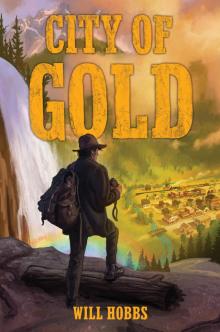 City of Gold
City of Gold Kokopelli's Flute
Kokopelli's Flute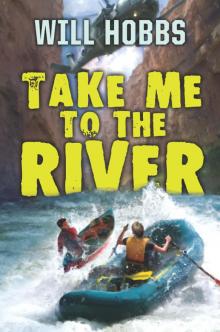 Take Me to the River
Take Me to the River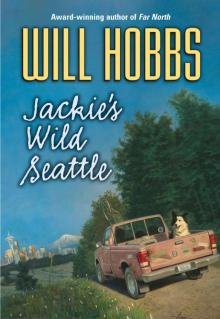 Jackie's Wild Seattle
Jackie's Wild Seattle The Maze
The Maze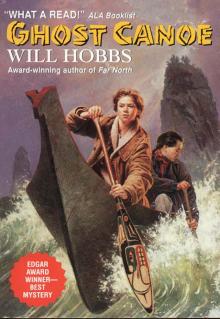 Ghost Canoe
Ghost Canoe Never Say Die
Never Say Die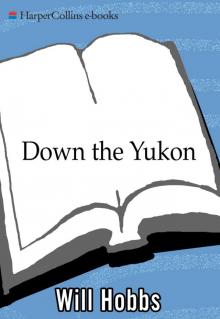 Down the Yukon
Down the Yukon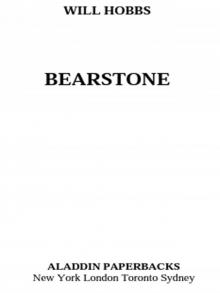 Bearstone
Bearstone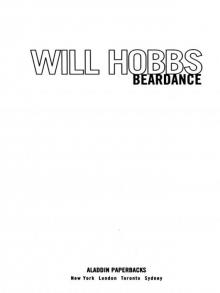 Beardance
Beardance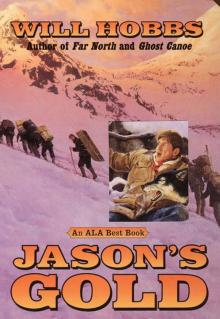 Jason's Gold
Jason's Gold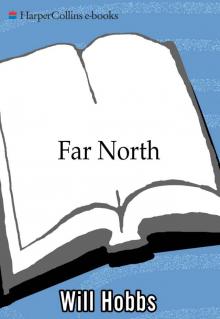 Far North
Far North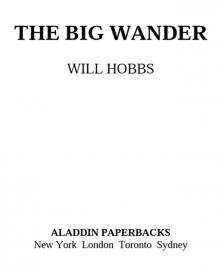 The Big Wander
The Big Wander River Thunder
River Thunder Downriver
Downriver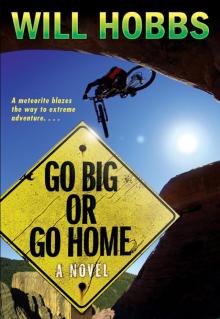 Go Big or Go Home
Go Big or Go Home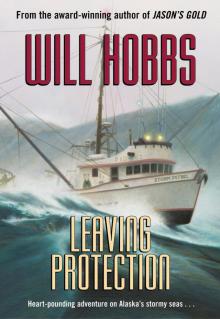 Leaving Protection
Leaving Protection Wild Man Island
Wild Man Island